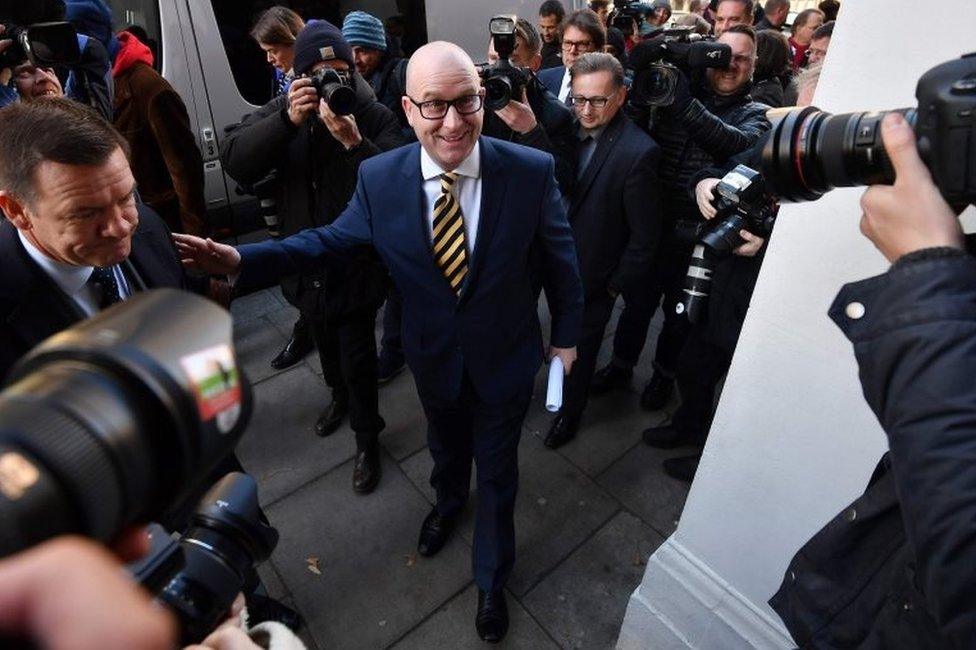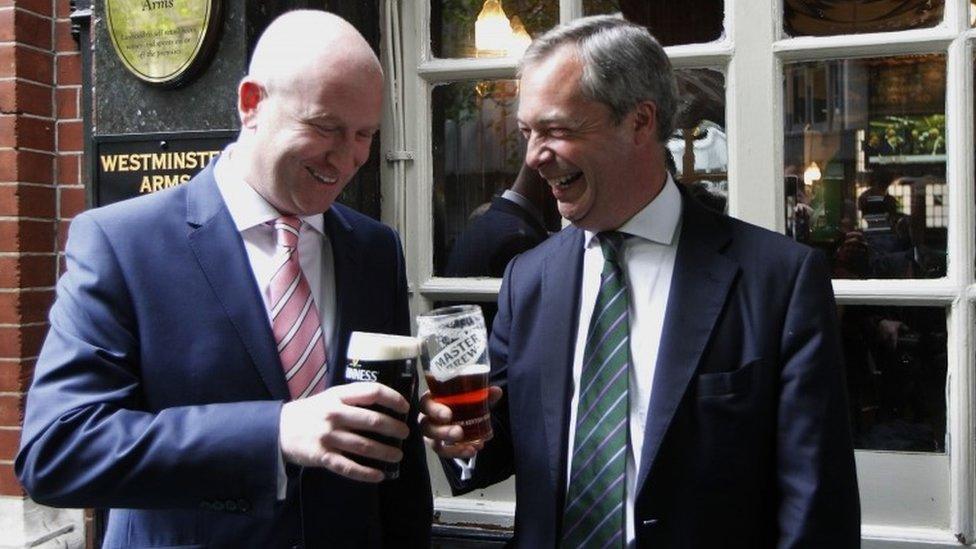Paul Nuttall: The new leader of UKIP
- Published
New UKIP leader Paul Nuttall: I have not just talked the talk, I've walked the walk
Paul Nuttall has been elected leader of the UK Independence Party, replacing Nigel Farage. But what do we know about him?
Paul Nuttall is angry with mainstream politicians who think they have a monopoly on "truth".
UKIP's new leader, a substantial figure on the Leave side of the Brexit debate, argues that the millions of voters who have rejected the establishment view of life rightly feel cheated.
Those who claim the rise of his party is part of a global movement towards "post-truth politics" get short shrift. Mr Nuttall promises instead a "post-deceit" age.
A familiar figure on political programmes for several years, he will now get the chance to show what that means. And then there's the task of getting UKIP - riven by factional disputes in recent months - back into shape, having promoted himself as the "unity candidate".
Becoming UKIP leader two days short of his 40th birthday, Mr Nuttall, a former history lecturer - and a schoolboy footballer for Tranmere - is a man in a hurry.
He was born in Bootle, Merseyside, on 30 November 1976, part of a Catholic family, attending local state schools.
At the age of 12 Mr Nuttall was in the Leppings Lane end for the Liverpool v Nottingham Forest FA Cup semi-final at Sheffield's Hillsborough stadium in 1989, which turned into a disaster claiming the lives of 96 people. It was, he has since said, "a day burnt permanently in my, and thousands of other minds".
After leaving school he studied sport science at North Lincolnshire College, studied history at Edge Hill College and trained to be a teacher at the University of Central Lancashire.
He worked part-time as a classroom assistant at St Winefride's Primary School, Bootle, while he took a master's degree in history from Liverpool Hope University. Mr Nuttall is said to specialise in the Edwardian era. After graduating he lectured at Liverpool Hope University from 2004 to 2006.
But he was already interested in politics. In 2002, aged 25, he ran for the Conservatives in a council election in Bootle. He told the Daily Post: "I was brought up in a staunch Labour community and never really thought about voting any other way.
"I left home for a few years and coming back to Bootle made me fully appreciate the levels of decay and decline. Now I just want to give people a reasonable alternative."

As UKIP leader Paul Nuttall will be the focus of constant media attention
In 2004, Mr Nuttall joined UKIP, then a minor party in terms of its share of the vote in Westminster elections.
He became an MEP - the youngest of the party's representatives in Brussels - for North West England in 2009 and, a firm ally of Mr Farage, he served as his deputy from 2010 until this September.
When Mr Farage quit the leadership following the summer's Brexit referendum, Mr Nuttall - immediately considered one of the favourites to succeed him - decided not to run, saying he too wanted his "life back".
"I have been at the forefront of the campaign to leave the European Union for a decade now," he said, "and I believe I can step aside with my objective achieved and my head held high".
His decision came despite Welsh Assembly Member Neil Hamilton backing him, saying: "I think the future of UKIP is to Hoover up the votes of disgruntled ex-Labour voters. Paul as an authentic Scouser from Liverpool is an authentic voice of northern working-class England."
Mr Farage's replacement as leader, Diane James, quit after just 18 days in the job and the vacancy reopening led Mr Nuttall to put himself forward. As several candidates pulled out he came, with the backing of much of UKIP's establishment, to be seen as the favourite.
Since the Brexit vote, Mr Nuttall has emphasised the need for a "grown-up" negotiation with the EU. He has also stressed that UKIP is no longer a "single-issue pressure group", with its founding aim - of the UK leaving the EU - on the way to being achieved.
Anti-Marxism
Growing up in the Liverpool of the 1980s, where Labour's left-wing Militant faction was at one stage dominant, seems to have coloured Mr Nuttall's world view.
In a blog post last year, he called for a war against "cultural Marxists", who "have changed the way we speak and the way we think", adding: "They've made the downright nonsensical acceptable and common sense unacceptable or politically incorrect."
A global warming sceptic, in 2010, he said UKIP would ban former US Vice-President Al Gore's climate change film An Inconvenient Truth from schools, calling it a "blatant piece of propaganda".
In 2015, he faced criticism , externalafter joking that "perhaps we should throw [Scottish First Minister Nicola] Sturgeon in front of a hunt horse" to commemorate the day of celebration for the life of leading Suffragette Emmeline Pankhurst.
In the same year, in a speech to the European Parliament, he said the EU's migration policies were enabling a "freedom of movement of jihad".
He recently aroused criticism when he said Russian President Vladimir Putin was, with his Middle East policy, "generally getting it right in many areas", although acknowledging him as "pretty much a nasty man beyond that".

Mr Farage has made much of his friendship with US President-elect Donald Trump.
Mr Nuttall was not part of the Farage squad that recently travelled to Trump Tower but he does agree on the link between Brexit and the US presidential result.
"Neither the Brexit vote nor the Trump victory was down to emotion rather than truth," he has said. "They were down to the people realising the truth that the establishment was not acting in their best interests."
He has said he would back a referendum on capital punishment, "if enough thought that was justified", for the killers of children.
Following his victory, there will be more pressure to demonstrate to the public a fuller view of his personality, in the way Mr Farage has done.
Mr Nuttall laughed off a potential embarrassment last year when, as UKIP's education spokesman, he was shown in the party's manifesto standing in front of photographically altered library shelves - with several titles being shown twice. He joked on Twitter: "I just have two copies of every book."
He will need to keep this sense of humour as UKIP, following an alleged fight in the European Parliament and the resignation of several senior figures - including former leader Diane James and former leadership candidate Steven Woolfe, seeks to move on without Mr Farage at the helm.
Mr Nuttall, who has spent time living and working in Barcelona, is credited with masterminding UKIP's strategy of targeting disillusioned Labour voters in parts of the North of England. "I want to replace the Labour Party and make UKIP the patriotic voice of working people," he said in his leadership acceptance speech.
When he announced his decision to stand, he said: "I have huge support out there across the country, not only among people at the top of the party in Westminster and with the MPs, but also among the grassroots.
"And I want to stand on the platform of being the unity candidate - UKIP needs to come together. I'm not going to be on here and gild the lily.
"UKIP at the moment is looking over the edge of a political cliff. It'll either step off or it will step back. And I want to be the candidate that will tell us to come back."
The work starts now.